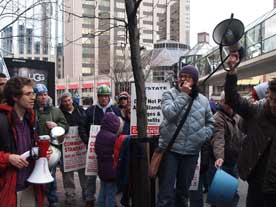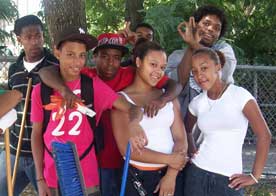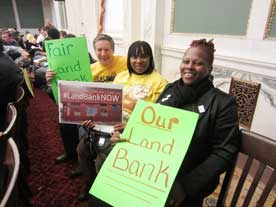Community, Labor, and Local Government
Atlanta’s community and labor activists are also collaborating with local government and other citywide institutions. At about the same time that the Green Justice Coalition was forming in Boston, Scott began to investigate how Atlanta might tap into the green economy to expand access to quality jobs. The work of the Emerald Cities Collaborative (ECC) came to her attention. The ECC is a multisector initiative developed in 2008 by J. Phillip Thompson, a professor of urban studies at the Massachusetts Institute of Technology; Gerry Hudson, executive vice president of SEIU; and Joel Rogers, director of the nonprofit Center on Wisconsin Strategy, with support from national foundations and capacity building intermediaries. Local partnerships in 10 pilot cities bring together local government departments, business leaders, large nonprofit institutions, labor unions, and community-based organizations to advance ECC’s three-pronged mission of promoting environmental sustainability and community economic development while strengthening democracy.
ECC’s first initiative leverages the U.S. Department of Energy’s Better Buildings Challenge to support energy retrofit projects that promise to generate a pipeline of high wage jobs with good benefits and career building opportunities for workers who are often excluded from the trades.
Scott convened key actors in Atlanta to launch the Atlanta Emerald Cities Collaborative, the only such collaborative in the southeast. Today, Emerald Cities Atlanta (ECA) operates as a separate organization. Members of its local council include labor unions, the Urban League, the City’s Office of Sustainable Development, and partners from local businesses and universities in addition to Stand-Up.
Under the leadership of interim director Garry Harris, ECA has begun to conduct energy assessments and audits. One project targets the buildings that constitute the 3 million square feet of office and retail space in downtown Atlanta’s Peachtree Center Complex. This summer, ECA launched a partnership with Georgia Piedmont Technical College to retrofit campus buildings while engaging students and faculty in the energy audit initiatives. Planning for more large-scale retrofit projects is underway.
To facilitate project implementation, ECA has appointed a “labor champion” who communicates and coordinates with all of the trade unions to ensure that labor’s interests are included in project planning and that workers with the appropriate skills perform the work according to the energy efficiency and “high road” labor standards.
Building Momentum and Scaling Up
CLU and Stand-Up are pursuing ambitious plans to build on these achievements. CLU is exploring two innovative statewide initiatives that aim to transform the regulatory and financial institutions that govern employers’ interactions with workers and their communities. With support from the National Employment Law Project, the Center for Popular Democracy, and Greater Boston Legal Services, CLU is convening several labor unions, worker centers, and other grassroots organizations to enact legislation that prevents subcontractors from evading minimum wage and other worker protections. CLU and its partners are also investigating the possibility of establishing a Massachusetts Community Infrastructure Bank to introduce financing mechanisms for energy efficiency, transit, and “new economy” projects.
Stand-Up’s Policy Institute for Civic Leadership is investing in a new cadre of civic entrepreneurs. Their eight-session intensive courses offer Atlanta’s established leaders a chance to learn from experts in economic development, analysts of city hall politics, and scholars of race, class, and power dynamics. Teams of labor and community leaders work together to germinate projects they can pursue after graduation.
Stand-Up is also in the process of establishing Build-Up, a nonprofit construction and development company that will hire women and men of color for short-term landscaping, graffiti removal, and other neighborhood improvement jobs that require fewer initial skills than the Trade-Up pre-apprenticeship program.
The bridges that CLU, Stand-Up, and the ECA are building between workers and communities have promise for the rest of the country. Better jobs and stronger communities need not be seen as separate any longer.






Comments